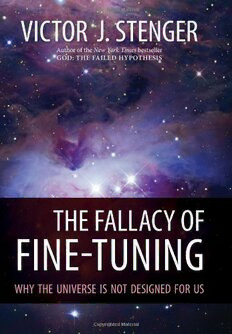
The Fallacy of Fine-Tuning: Why the Universe Is Not Designed for Us PDF
02011·3.198 MB·English
Most books are stored in the elastic cloud where traffic is expensive. For this reason, we have a limit on daily download.
Preview The Fallacy of Fine-Tuning: Why the Universe Is Not Designed for Us
Description:
A number of authors have noted that if some physical parameters were slightly changed, the universe could no longer support life, as we know it. This implies that life depends sensitively on the physics of our universe. Does this "fine-tuning" of the universe also suggest that a creator god intentionally calibrated the initial conditions of the universe such that life on earth and the evolution of humanity would eventually emerge? Some influential scientists, such as National Institutes of Health Director Francis Collins, think so. Others go even further, asserting that science "has found God."In this in-depth, lucid discussion of this fascinating and controversial topic, physicist Victor J. Stenger looks at the same evidence and comes to the opposite conclusion. He states at the outset that as a physicist he will go wherever the data takes him, even if it leads him to God. But after many years of research in particle physics and thinking about its implications, he finds that the observations of science and our naked senses not only show no evidence for God, they provide evidence beyond a reasonable doubt that God does not exist.Stenger argues that many of the claims by theists are based on their misunderstanding of the science. He looks at the specific parameters and shows that plausible reasons can be found for the values they have within the existing standard models of physics and cosmology. These models are introduced in detail so that the reader has the background needed to understand the role of the parameters claimed to be fine-tuned and judge the veracity of the arguments.He also discusses related issues such as whether or not the universe had a beginning, what quantum mechanics implies about the involvement of human consciousness in affecting reality, and whether evidence can be found in nature for a divine plan.Although Stenger has touched on the subject of fine-tuning in other books, this is his most thorough exploration of a topic that continues to intrigue scientists and the lay public alike.
See more
The list of books you might like
Most books are stored in the elastic cloud where traffic is expensive. For this reason, we have a limit on daily download.
